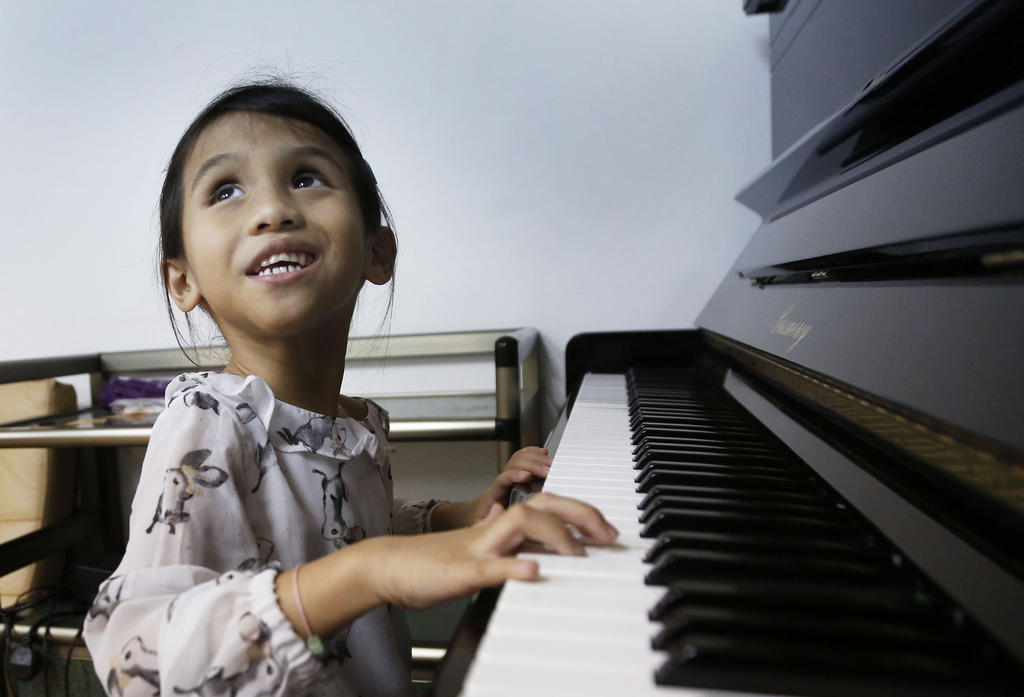
SINGAPORE — Popular lullaby “Twinkle, Twinkle, Little Star” was the first song that five-year-old Anisah Daaniys, who was born blind, taught herself to play by ear on the keyboard.
Anisah was diagnosed with retinal dystrophy when she was three, and as a result of her condition, she is only able to make out large shadows in front of her due to her low light perception.
“She’ll listen to songs on YouTube over and over, go the keyboard and test out the keys one by one before making out the tune,” said her mother, Ms Nurul Zayani, 32.
Ms Nurul first noticed her daughter’s condition when she was a baby, as Anisah did not respond to the toys dangled in front of her.
While they were aware of Anisah’s condition, receiving their child’s official diagnosis from the doctors was still a blow to the young parents.
“When we first got the results, we were very sad, especially because she is our first kid, but I think it affected her grandparents even more because she is their first grandchild,” said Anisah’s father, Mr Muhammad Sufian.
“A lot of concerns crept into my mind,” added the 34-year-old.
He worried for his child’s future, and feared the day when he would no longer be able to care for Anisah.
His fears were compounded when Anisah’s younger sibling, three-year-old Muhammad Nabil Aydin, was also diagnosed with the same condition.
He said: “Right now, we are still young and both still working, what would happen when we’re older and not working, how do we take care of them?”
Mr Sufian and his wife both work as engineering specialists, earning a total of around S$6,000. Other than paying for Anisah’s school fees, the duo’s incomes also go toward supporting Mr Sufian’s parents, who live with the family.
The TODAY Enable Fund has helped defray Anisah’s education costs, as the five-year-old is a beneficiary of the fund, and she received S$3,000 in October last year. Her parents first learnt about the TODAY Enable Fund through the Singapore Association of the Visually Handicapped (SAVH). A portion of the money went into buying a brailler — a typewriter for the blind with six keys, one for each of the dots in a braille cell — which cost S$1,800, even after subsidies.
With the help of the brailler, Anisah has begun learning how to spell words and form longer sentences.
The family has also engaged a teacher from iC2 PrepHouse, a charity that provides training programmes to help children with low vision and blindness, who home schools Anisah for an hour, three times a week. The lessons cost about S$60 a month. They chose this option because attempts at enrolling Anisah in kindergarten were unsuccessful as Ms Nurul found that not many pre-schools cater to children with special needs, and they also preferred one close to their home in Tampines.
Anisah’s parents also plan to use the funds to pay for Anisah’s singing lessons, as she enjoys singing along to the tunes she plays on the keyboard.
“We can see that singing and playing on the keyboard gives her joy, and it is her passion,” said Ms Nurul.
She added, with a laugh: “It is rare to have a quiet moment around her.”
Besides belting out tunes, Anisah has also taken to imitating characters from her favourite television cartoon programmes.
“Recently, her favourite is the cartoon Upin and Ipin, she would mimic the way the characters talk,” said Ms Nurul, referring to the Malaysian animated cartoon series on the adventures of a pair of fun-loving twin brothers in a Malaysian kampung.
Anisah’s cheery disposition, jovial attitude and infectious laughter has certainly helped her parents cope during the tough times, as Mr Sufian and Ms Nurul shared that explaining how things work to an inquisitive five-year-old can take double the time due to their child’s condition.
“(Other parents) can show their children how a spoon is used, but we have to get her to feel, touch the spoon, explain to her what it is, what it does, and guide her hands every step of the way,” said Ms Nurul.
Mr Sufian added: “The one thing that has helped us a lot is her character, it takes the pain away from us bit by bit.”
While Anisah has made some progress since she was first diagnosed with her condition, her parents acknowledge that their daughter is a long way from becoming fully independent.
For one, she still has not adapted to using her cane, which can be cumbersome and heavy for a five-year-old.
“As of now, she still prefers to follow people around,” said her mother.
The young couple are also hopeful that Anisah will be able to enroll in a mainstream primary school in two years’ time.
Mr Sufian said: “We know that the environment might be entirely different in primary school, and we are unsure how others will react to Anisah.”
“We just hope (that by enrolling her into a mainstream school), she will be able to study and catch up with the other kids,” added Ms Nurul.